POSITION:JILI - jili slot - JILI Games - JILI Casino > JILI Games >
jplay Party-list system: What to know ahead of 2025 polls
Updated:2024-10-22 13:02 Views:104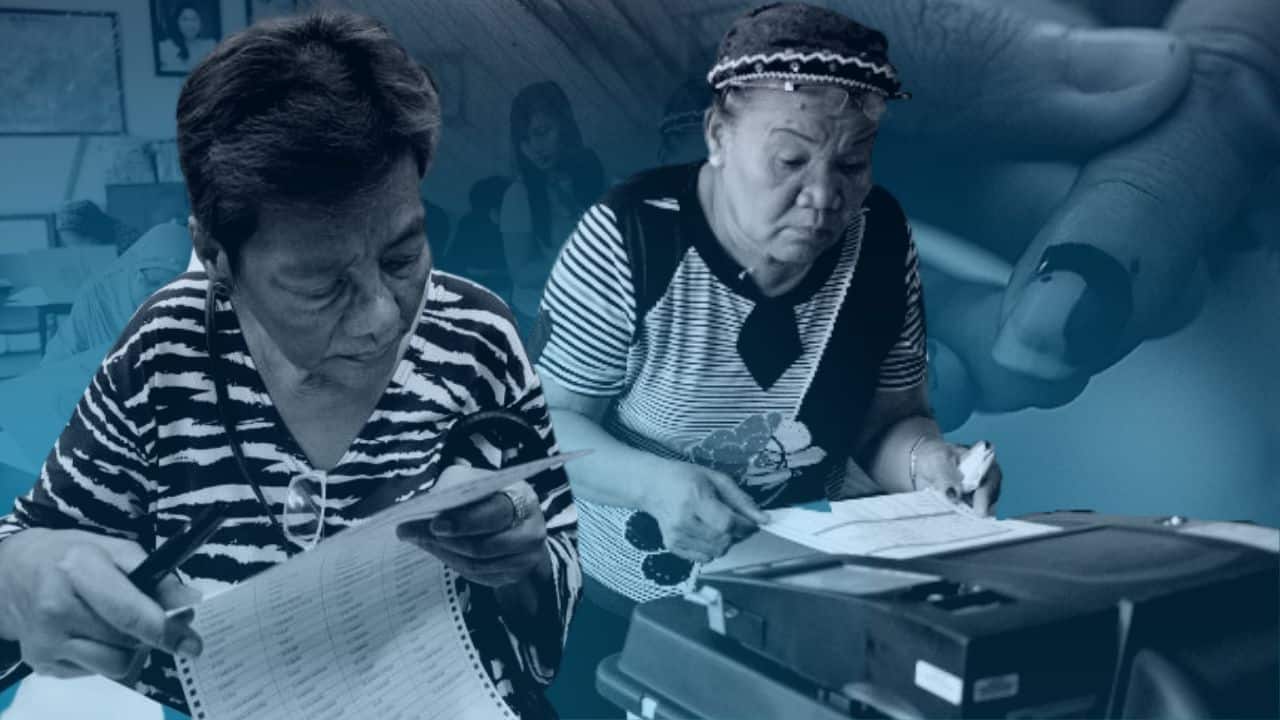

MANILA, Philippines—As the 2025 midterm elections approach, voters are gearing up not only to choose local leaders but also elect party-list groups — who are expected to be the voice of marginalized sectors in Congress.
With their crucial role in giving marginalized sectors and minority groups a voice, the party-list race offers voters a chance to support causes close to their hearts, from labor rights to women’s advocacy.
Article continues after this advertisementWith 63 seats up for grabs — and a mix of familiar groups, new faces, and rising contenders vying for them — here’s what you need to know about the system that helps shape the future of Congress.
FEATURED STORIES NEWSINFO Kristine now a tropical storm; Signal No. 1 up in 24 areas nationwide NEWSINFO Walang Pasok: Class suspensions on Tuesday, Oct. 22 NEWSINFO Sandro Marcos calls out VP Sara Duterte: ‘You crossed the line’ What voters should knowThe party-list system in the Philippines was created through Republic Act No. 7941, which was signed into law by then-President Fidel Ramos on March 3, 1995. This law sought to guarantee representation for historically marginalized sectors in government, allowing them to advocate for their interests and participate in the legislative process.
While the law was enacted in 1995, it was not put into effect during that year’s elections. The Commission on Elections (Comelec) subsequently issued the required rules and regulations for the party-list system in June 1996. As a result, party-list groups took part in the 1998 elections, aiming to secure seats in Congress.
Article continues after this advertisement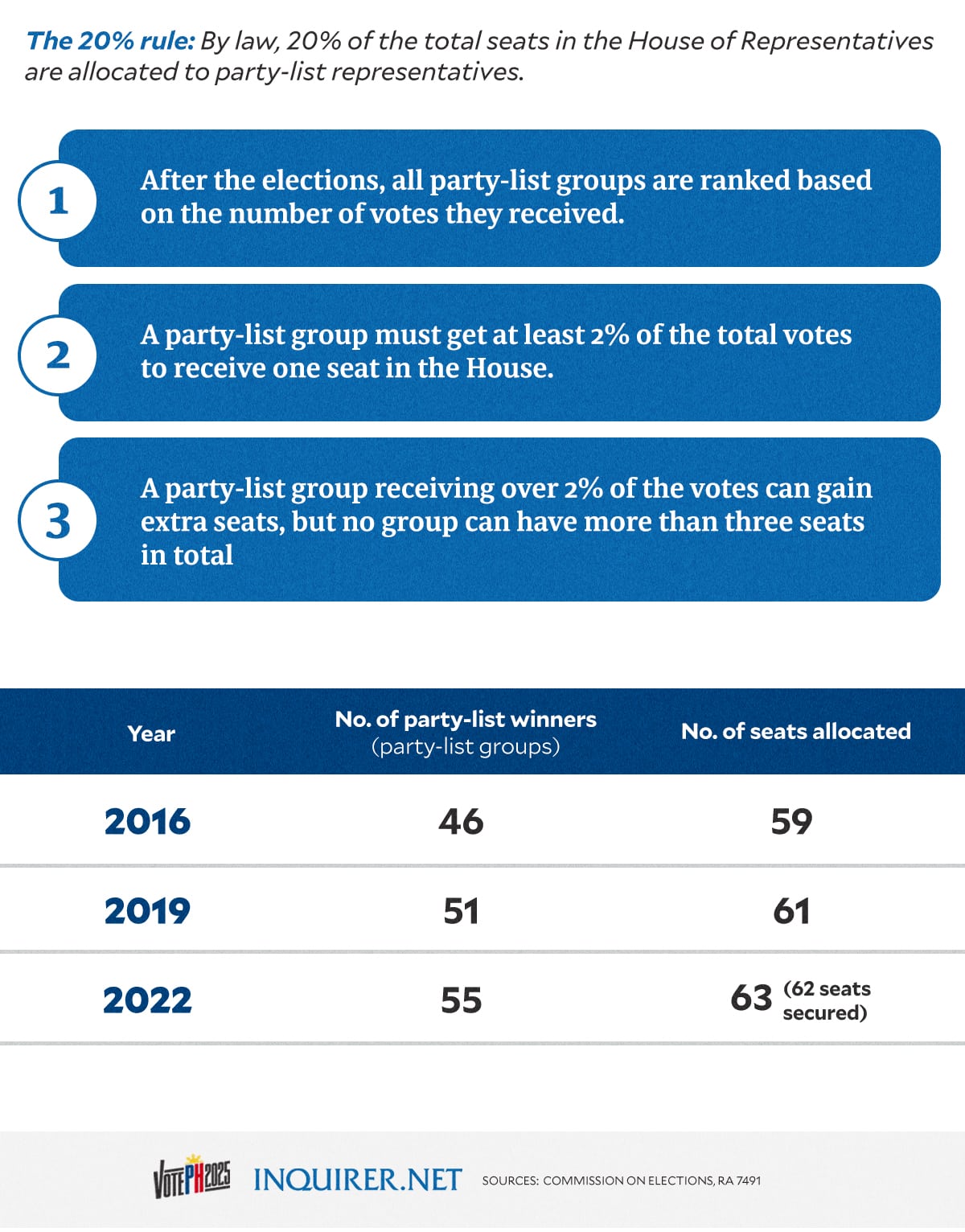

GRAPHIC: Ed Lustan
Decades later, the country and its voters continue to choose and elect which party-list groups could secure a seat in the House and help craft laws.
Article continues after this advertisementLast week, Comelec released the full list of the 156 party-list groups which will appear on the official ballot for nect year’s elections. Of the number, 113 are existing party-list groups, 42 are newly registered organizations, and one secured a temporary restraining order (TRO) from the Supreme Court.
Article continues after this advertisement Vote for only one partyAs the Comelec has indicated that the list of party-list groups may still change in the coming days, voters should keep the following points in mind before casting their votes in the midterm ekections.
Vote for a Party-list group, not an individualWhen you vote, you are selecting a party or organization not an indibidual candidate.
Article continues after this advertisementWhen a party seeks accreditation from Comelec, it must provide a list of up to five nominees. If the party is successful in obtaining a seat in Congress, the first nominee on this list will take office. Should the party win more seats, the subsequent nominees will also be given seats.
You can only vote for one (1) party-list groupAlthough there are 63 available seats for party-list representatives in the upcoming 20th Congress — representing 20 percent of the total House of Representatives seats — you are only allowed to vote for one party-list group.
Out of the 156 parties and organizations running, choose only one. If you mark more than one group, the vote for the party-list section of your ballot will be invalidated by the counting machine.
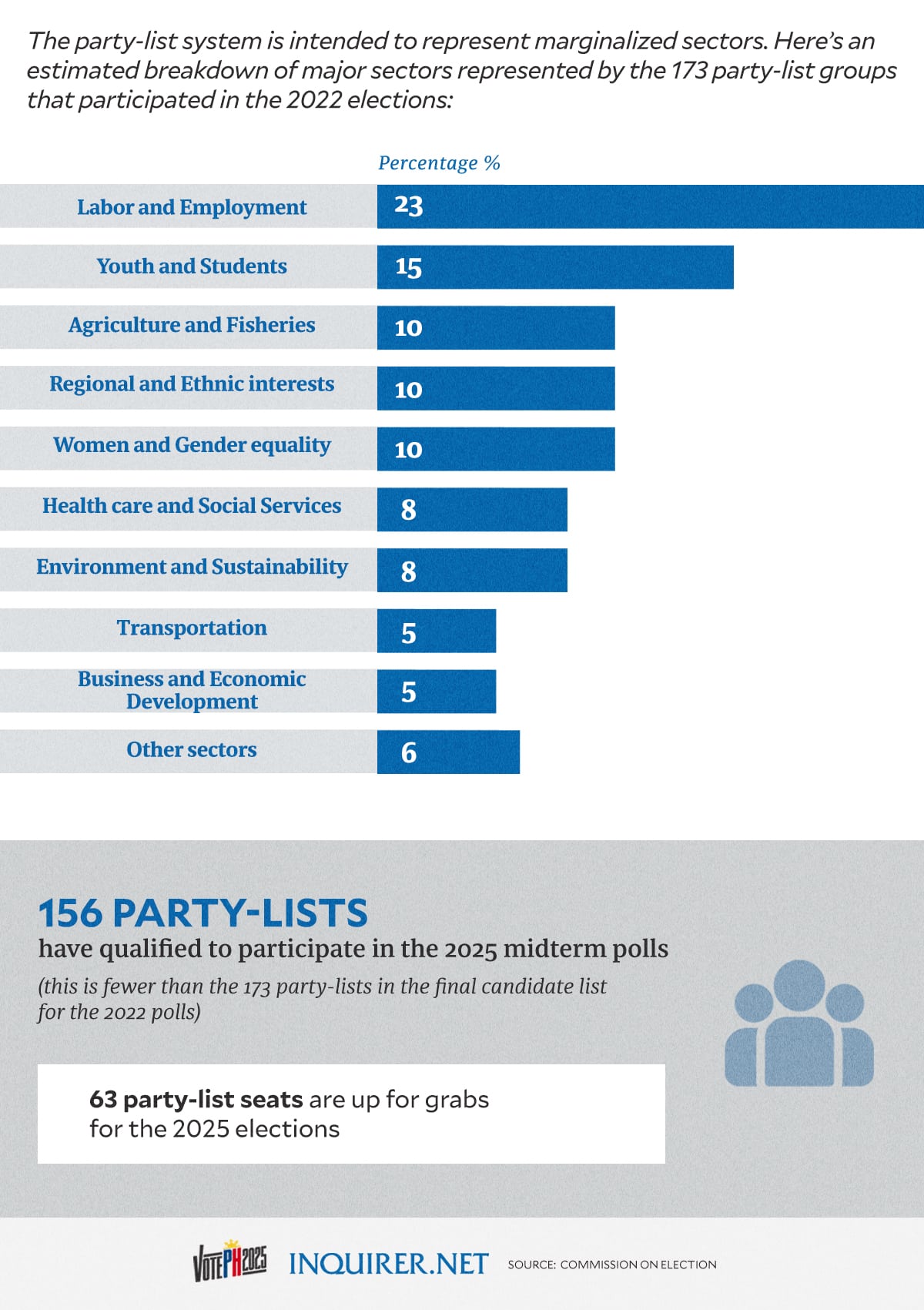

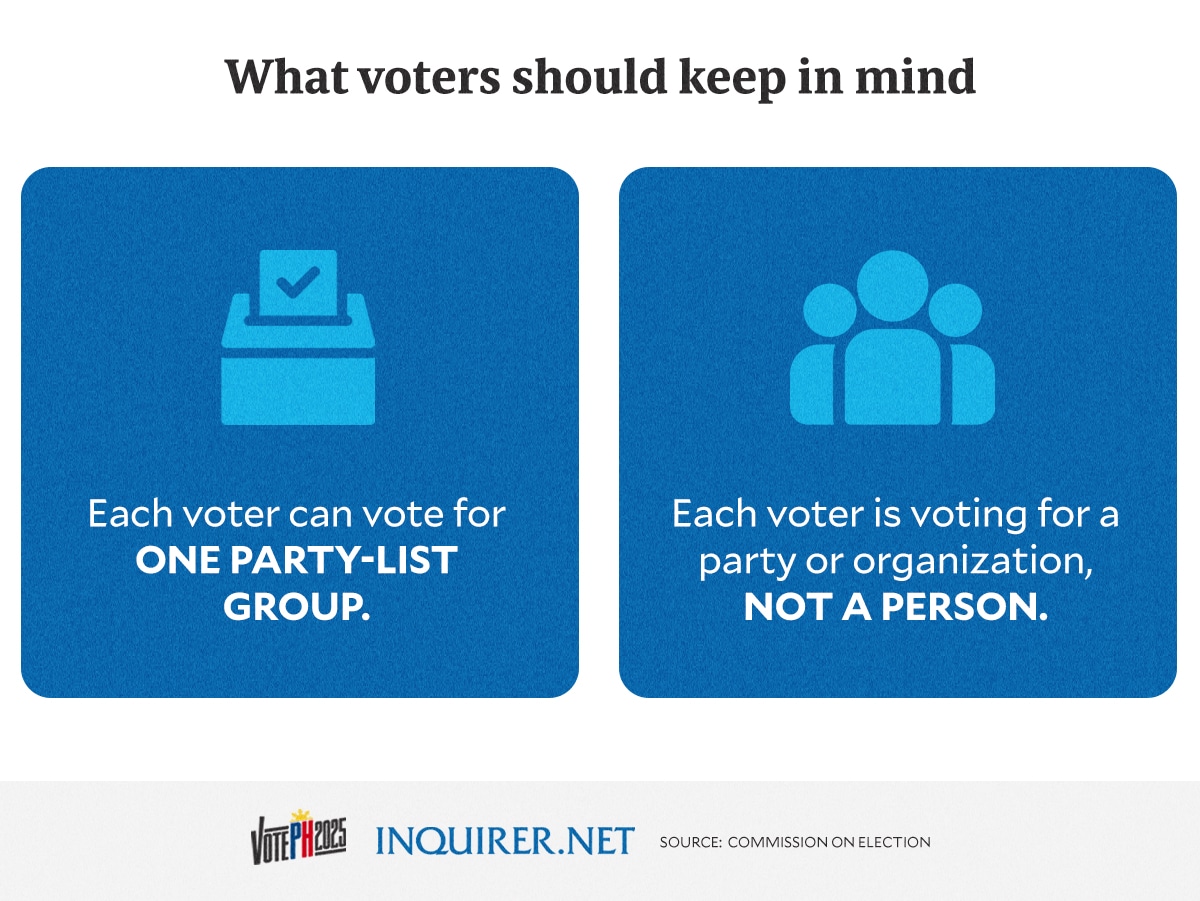

GRAPHIC: Ed Lustan
Seat allocationTo secure a seat in the House, a party-list group must receive at least two percent of the total votes cast. Groups that surpass this threshold can earn additional seats, but no party-list group can hold more than three seats in total.
READ: HOW IT WORKS: Party-list seat allocation in the House
Fewer groupsFor the elections next year, the number of qualified party-list groups has decreased slightly from the 173 that participated in 2022.
According to Comelec Chairperson George Erwin Garcia, the poll body removed at least 30 unaccredited party-list groups from the 190 that submitted their Certificates of Nomination and Acceptance (CONAs) from October 1 to 8.
Meanwhile, four of the remaining 160 groups failed to file their CONAs, effectively removing them from the official list.
Earlier this month, a resolution dated October 1 indicated that 42 party-list groups were deemed ineligible for the upcoming elections. Comelec reported that 31 of these groups failed to secure at least 2% of the votes in previous elections and did not obtain a seat in the House of Representatives.
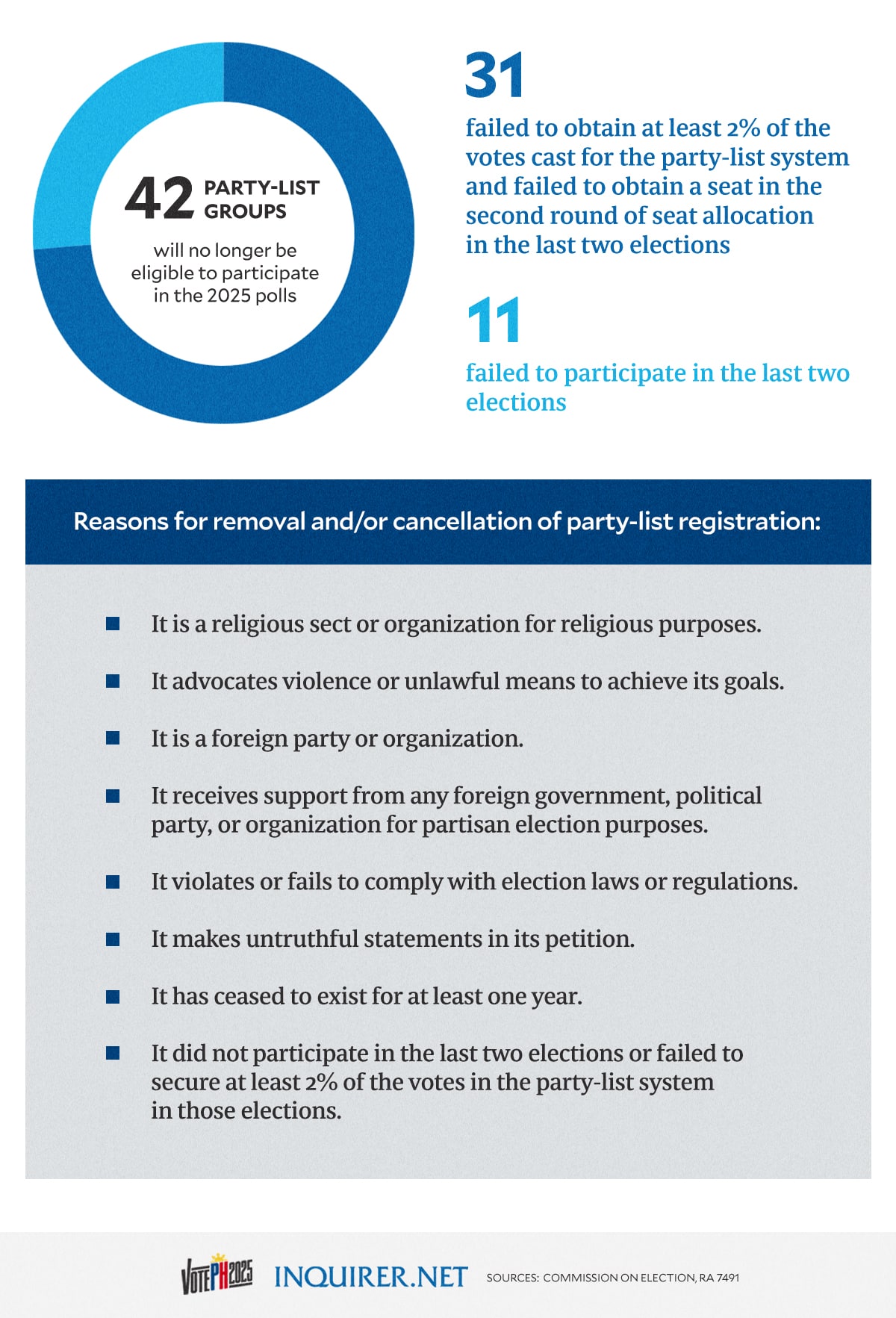

GRAPHIC: Ed Lustan
Additionally, the registration of the remaining 11 groups will be canceled due to their failure to participate in the last two elections.
READ: LIST: 42 party-list groups fail to qualify for 2025 elections
According to Republic Act No. 7941, the grounds for removal or cancellation of party-list registration include:
Being a religious sect or organization focused on religious purposes. Advocating for violence or unlawful means to achieve their objectives. Being a foreign party or organization. Receiving support from foreign governments, political parties, or organizations for election purposes. Violating or failing to comply with election laws or regulations. Providing false statements in their petitions. Ceasing to exist for at least one year. Not participating in the last two elections or failing to secure at least 2% of the votes in those elections. Familiar, notable namesSeveral party-list groups that have consistently made an impact in previous elections are back on the ballot for the 2025 polls. These include both those that have previously run and those that have secured seats in the past two elections, such as:
Anti-Crime and Terrorism Community Involvement and Support (ACT-CIS) – topped both the 2019 and 2022 elections 1-Rider Partylist Tingog Sinirangan (TINGOG) 4PS Ako Bicol SAGIP Bayan Muna Gabriela KabataanIn addition to these returning groups, several notable personalities have been reported to be running as nominees or representatives of various party-list groups:
Former Sen. Leila de Lima: First nominee of the Mamamayang Liberal party-list. Human rights lawyer Chel Diokno: Akbayan party-list’s first nominee. Former Sarangani Vice Governor Jinkee Pacquiao: Second nominee of the Maharlikang Pilipino sa Bagong Lipunan (MPBL) party-list. Internet personality Deo Balbuena (aka Diwata): Fourth nominee of Vendors Party-list. George Royeca, Chief Executive Officer (CEO) of ride-hailing platform Angkas: Angkasangga Party-list’s first nominee.The 90-day campaign period for national candidates — those seeking seats in the Senate and party list posts — will be from Feb. 11 to May 10, 2025.
READ: UPDATES: 2025 elections precampaign stories
RELATED STORIES:
Subscribe to our daily newsletter
The lure of politics: Some celebrities shun the circus
‘Party-list nominees deemed resigned from gov’t post once campaign starts’
READ NEXT INQside Look with senatorial aspirant Tito Sotto Classes in Quezon province suspended due to Kristine EDITORS' PICK WPS: US missile deployment to PH key for combat readiness – US general Marcos smiled, walked away when asked about VP Duterte’s accusation UPDATES: 2025 elections precampaign stories Manila Water Foundation and partners underscore benefits of handwashing Central Visayas’ most wanted killed in shootout in Argao, Cebu Heart Evangelista: Woman to woman, I never had a problem with Pia Wurtzbach MOST READ SC issues TRO vs Comelec resolution on dismissed public officials Tropical Storm Kristine slightly intensifies; Signal No. 2 in 5 areas LIVE UPDATES: Tropical Storm Kristine Espenido retracts drug-related allegations vs De Lima View comments
